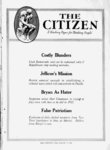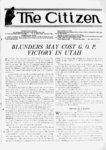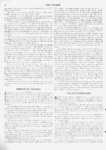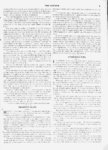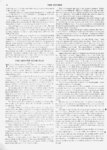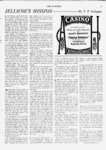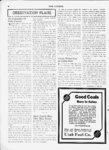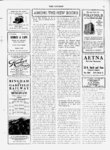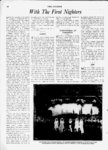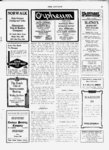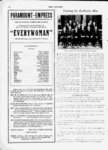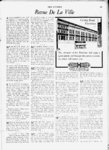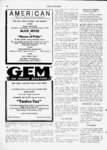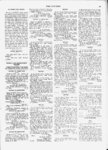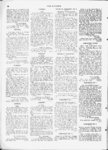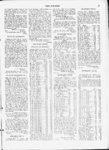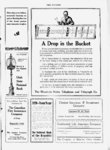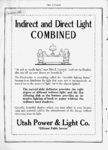| OCR Text |
Show THE CITIZEN speaker of the House says by way of excuse that the investigation is incomplete and that the five men will have a chance to be heard later. It is a strange reversal of those honored traditions which impel us to regard a man as innocent until he is proved guilty. When the investigation has been finished these five men, there is sound reason for believing, will turn out to be direct actionists who would gladly seize the firebrands of revolution at the first favorable moment and set the whole social structure blazing. We have become accustomed to their type and are not easily deluded by their disguises. If it were simply a question of sympathy we would not care to waste much of it on men who frankly confess that they would, if they could, supplant our republican institutions with the institutions of communism and anarchy. The question goes down, however, to the of principle. We shall not be able to guard our libervery ties if we commit ourselves to injustice. There can be no true freedom without justice. It is of the very essence of republicanism, of democracy and of what is sometimes denominated liberalism to guard religiously the rights of minorities. Liberty should have a large tolerance for opinion and for the processes of fair discussion, for only by means of deliberation and discussion can republics be made to operate at all. These radicals, it is true, are really despots. Radicalism differs from liberalism in that it has no tolerance. We have seen radicalism in action in Russia. We have seen it annihilating all opposition within the sphere of its power. Religion, morality and the home have been subverted as well as the rights of private property. It has had no re- gard for the rights of the weak. It has no toleration for even the slightest whisper of hostile opinion. Such has been the modern day experience with radicalism. It has become a hateful despotism wherever it has been able to assert its dominion. If we who have founded our republic on liberty and made it a shining success before all the world should now adopt the ways of despotism we should show small faith in our own works and would be playing into the hands of those who would destroy our government. Five communists cannot overthrow the government of New York state simply by taking their places as members in the legislature. If they do not openly preach the use of violence they must of necessity challenge their foes to combat with Libertys weapons of discussion. There ought not to be any doubt as to the outcome of that debate when an American public is the umpire. Governor Smith is right, therefore, in declaring that the legislature was guilty of a grave blunder when it excluded from its deliberations five men who had been duly elected by their constituents. After all the evidence is in then, and not until then, should the legislature exercise its arbitrary power of exclusion and not even then if it be shown that the five communists have not advocated the overthrow of the government by violence. If we are careful to accord justice we need not fear for liberty. uses a government club to obtain credit that would not otherwise be given. It is, however, only a charge and while it is inconceivable that Chairman Hays would make the accusation without the best information there is always chance for mistake. While Chairman Hays did not say that the secretary had furnished the names of all Liberty bond buyers for the use of the Democratic committee, he did say that the Democratic administration had sent out thousands of tons of propaganda most of it of a Democratic political nature to Liberty bond buyers, food card signers and others, at a time when paper was so short that the government found it necessary to limit the supply going to the press of the country. All of the propaganda, of course, is paid for out of the pockets of the taxpayers. It will be recalled that in his Salt Lake speech the speech in question Chairman Hays made a statement to which neither he nor the secretary alludes. He called attention to the fact that Postmaster General Burleson had ordered a census taken of all adults, men and women, on the rural mail routes of the entire country, and he suggested that these names probably would appear later on the Democratic mailing lists. At all events, no convincing explanation has yet been made as to the need of this special census. Apparently the taking of it will merely add to the intolerable delays which mark the delivery of mail under Burlesons administration. tap-roo- ts SMASHING GLASS Carter Glass, secretary of the treasury, tripped into a and one can mentally picture him as swathed in bandages saturated with soothing linamcnt. It came to his rather extended cars in Washington that Chairman Hays had made a certain charge against the administration, and particularly the secretary of the treasury. Without waiting to ascertain just how much of a task he was going to have on his hands lie challenged the chairmans supposed statement. It transpired that the chairman had not made the particular charge, but was ready with one immeasurably more serious. Chairman Hays declares, upon what he describes as reliable information, that the Democratic committee had been drawing drafts on bankers in whose banks government funds were deposited, wiring the bankers that the drafts were out and asking acceptance. The original charge, while grave, loses its power to shock when set alongside the new charge. The practice of which the Democrats arc accused amounts almost to a misuse of government funds, for it H.GHTLY nest ANARCHY'S PLEA , we had been told five years ago that after the great war the two' IFpowers pitted against each other for the dominion of the earth would be, not democracy and aristocracy, but democracy and anarchy, we would have shown ourselves more or less politely skeptical. Not that aristocracy has disappeared; on the contrary it is still with us and is seeking to make an offensive and defensive alliance with democracy. In some lands it takes the form of junkerism, as in Germany, hereditary caste as in England and plutocracy as in America. But the contest now is between democracy and anarchy and, of is no all, radical but conservative. strangest democracy longer Democracy desires to preserve what it has gained. Anarchy, having nothing to lose, wishes to destroy that it may establish what it deems to be a new and better civilization. The theory of the philosophic anarchist is that man should be a law unto himself and that the time is coming when justice will be so written in the hearts of men that they will no longer need the restraints of statutes, but will serve one another through love and sympathy. It is the ideal of a fanatic who cannot take human nature as he finds it. The danger of the ideal is that it has no true relation to us-oto the world we live in. It is a dream of a remote earthly elysium. If the ideal appealed only to the fanatics the world would not be in such turmoil. It fascinates all men who seek escape from themselves or their environments. The dissatisfied all over the world are of Escape. running after this Democracy has become conservative because it believes that civilization has made some real gains and that man will be wise if he does not permit these gains to slip out of his hands. Democracy prefers to cling to realities, to recognize the existence of good and evil and to hold fast to every advantage good gains over e vil in the never-endin- g r will-of-the-w- isp struggle. Throw it all away, says the temper. Be a law unto yourselves and you will find you have no need of religion, virtue, marriage, law or restraints of any kind. This is the appeal which Bolshevism is making to a world that is starving physically and that has drifted away from its spiritual moorings. Anything else is better than that we have, seems to be the shibboleth of the legions of the demon, Unrest. This tendency of man to escape from himself is as old as man. It is a story that has been told ever since Adam and Eve, in Paradise and apparently in perfect happiness, were seduced into the belief that they could obtain something better by merely eating an apple. |
